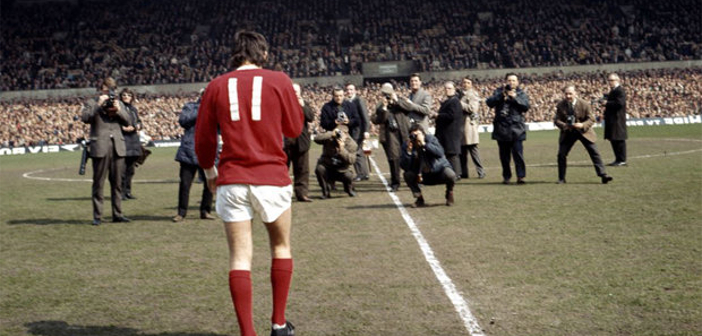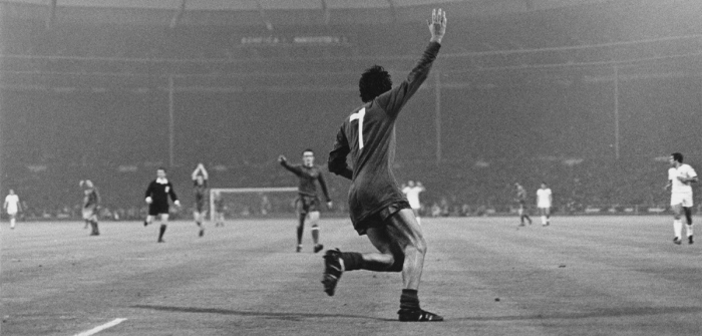Film Review | How Does Daniel Gordon’s Best Balance the Footballer’s Achievements with His Tragic Personal Life?
Best, Daniel Gordon’s new documentary about one of Football’s brightest and briefest of shining lights, opens with a starkly chilling and de-mythologizing anecdote. Angie Best, the late Manchester United star’s first wife, tells us how she was driving home late one monstrously wet night not shortly after the birth of their child, Callum. The camera, inside a car, shows the rain pouring, falling down from the heavens with the windshields wipers failing, in Sisyphean fashion, to clear the view. Angie looks out on the sidewalk and sees a tramp drenched, staggering about, almost oblivious to the torrid weather that surrounds him. When the car slowly rides alongside him, however, she realises this is not a homeless man. Rather it’s her husband George Best, international soccer star, lurching his way home after a typical liquor-fueled night out. She opts not to pick him up and drives on.
By opening this poignant and tragic portrait of a Northern Irish icon with such a story, Gordon is immediately setting a deliberate tone: Best is not so much a profile of one of the sport’s most naturally gifted players as it is a biography of a broken man who happened to have a career as a professional footballer. Sure, much of the first half is dedicated to the glittering successes, breath-taking goals and record-breaking exploits Best gave us, but these sunnier highlights will be laced with a tinge of wistful tragedy by the film’s end.
George Best’s excessive tendencies, especially with alcohol, are well known but less known perhaps is the degree to which those tendencies harmed his footballing legacy. Without them, its possible that even those outside of Europe would speak of him in the same breath as Pelé and Maradona in those oh-so-didactic “greatest ever” conversations. It speaks volumes about his potential that even with all he achieved there was a still a sense of “what could have been” by the time he hung up his boots. Best is ultimately a document of how a misunderstood affliction—addiction—can derail even the most seemingly sought-after and ideal of existences.

In terms of form, Best shares many of the stylistic touches that we have seen from so many other recent entries into the bio-doc formula, especially the ones about cultural icons (Senna, Montage of Heck, Marley). Mirroring the likes of Asif Kapida’s Amy, there is no detached, expositional narrator. Rather, past recordings featuring the posthumous voice of our central figure guide the action, as contributions from friends and family give colour to the man. While the familiarities of the genre may cause bio-doc fatigue in anyone who has kept up to date with the recent influx, Best still does what it does well enough to offer a nuanced, warts-and-all perspective.
This is George Best as predetermined tragedy. Gordon doesn’t try to offer any overarching explanation for the troubles that beseeched Best, instead allowing the voices of those who knew him try make sense of it. They offer a myriad reasons for Best’s descent into the alcoholic abyss—homesickness, manager Matt Busby’s departure, lack of outside guidance, the stressful trappings of fame—but none of them seem to really offer adequate clarification. Many of these figures, players and friends alike, by their own admission, never felt they were allowed in by Best. They were like satellites orbiting his planet, seeing all he had to offer, but never really being able to get close.
Best had, what seems to be, a reasonable and affectionate upbringing. He was a shy teenager in Belfast with loving parents, who at 15, realised every young boy’s dream when he was offered a trial at Manchester United. His immense skills and roguishly mop-topped good looks soon thrust him into the spotlight like no one in his career before. All this made him England’s “first pop star footballer”, showing up in ads for sausages, eggs and cologne (the sixties were a simpler time), as well as state intuitions like Top of the Pops. Without even meaning to, Best broke new ground in terms of what a professional could be doing outside of the game. He also found himself in an uncomfortable position that the industry around him was not yet prepared to protect him from: celebrity fandom.

Nonetheless, Best’s demons appeared to be more deep rooted. The closest we get to really understanding them is when later we learn that his mother Ann, who like her son suffered a premature death in her fifties, was also an excessive and heavy drinker. Another debate which rages is whether the alcohol abuse led to his football failures or whether those failings led to him to abusing alcohol. Whatever the answer, it’s certainly evident that his incomparable talent and successes did little to stem the tide of the trouble he found himself awash in.
A telling moment in the documentary acts as a microcosm to the tragedy of the George Best quandary. In his own words, we hear Best describing that fateful night in ’68 when Manchester United beat Benfica 4-1 to clinch the European cup, his greatest ambition. He says he remembers the match, the goal he scored, the routine lap of honour but he couldn’t for the life of him remember where they went afterwards, or how they celebrated. Even in what many would see as the pinnacle of his career, Best still felt the need to enhance the feeling with the substance that would ultimately end his life. The chilling conclusion to be made is that maybe getting all that you could have ever wanted, is the worst thing that could have happened to George Best.
Best: George Best by Himself is in Irish cinemas from Friday, February 24th. View the trailer below.
[arve url=”https://youtu.be/BvU3xW1QjCY” align=”center” autoplay=”no” maxwidth=”750"]

